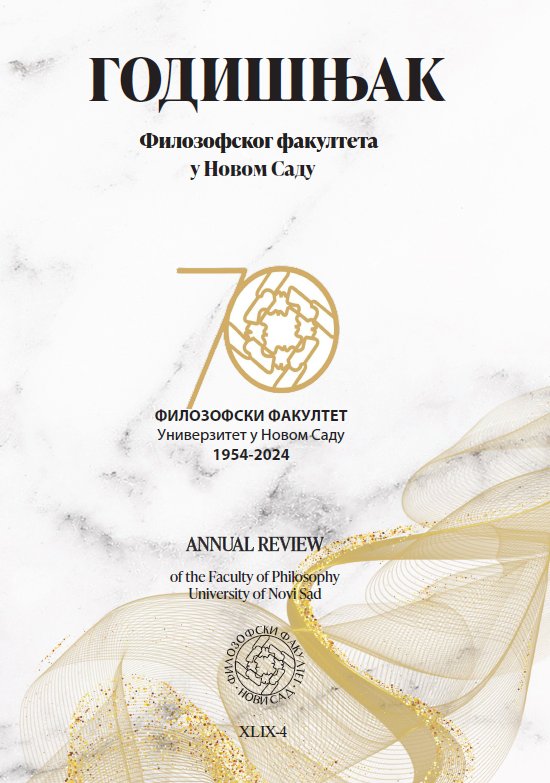ITALIAN LITERATURE IN THE CURRICULA OF PRIMARY AND SECONDARY SCHOOLS IN SERBIA
Main Article Content
Abstract
This paper is based on research into the representation of Italian literature in the current curricula and teaching programs (Serbian language and literature) of primary and secondary schools in Serbia. The paper presents literary works that are mandatory and elective content, works that are read in excerpts or in their entirety as school or homework readings. It examines how the selection is made and to what extent contemporary Italian literature is represented, as well as how much the new programs deviate from the multi-decade pattern dominated by representatives of Humanism and the Renaissance. Although new literary works are a refreshment and a departure from the multi-decade pattern, through literature teaching, in light of spreading the perception of Italian culture, art, and history, there is potential for much more. Progress is noticeable in the approach and inclusion of foreign works, including Italian literature, in education. There is a visible need to introduce more contemporary works and authors into school practice, as well as reasons for slow progress in realizing such an idea. However, some changes in approach are evident at all levels – both in primary and secondary schools, both through the choice of works to be read and through the approach to them. In teaching practice, there is still a challenge in the cultural, interdisciplinary approach to the literature, which relies on correlation within and outside the subject, on a comparative and intertextual approach to the literary work. All this is evident through accompanying materials in textbooks, which often do not open up broader possibilities of reception, although it could be done in many different ways. While some publishers offer innovative approaches such as including original illustrations by authors, documents, and additional materials that expand understanding of the context and significance of the text, others neglect this important dimension, which can limit the possibility of proper judgment about its values in the context of the entire literature. In addition to the proper inclusion of Italian literature in education, the idea of this paper was also to emphasize, using this specific example, the need for intercultural education and the promotion of understanding of different literary traditions and cultures. If students read works by Italian authors as part of school or homework reading, and are given the opportunity to get acquainted with Italian literature, it is important that this perception does not remain just as the isolated world of a literary work, but that it opens up the possibility of understanding the wider picture of Italian culture, art, and history, as well as world literature in general.
Downloads
Article Details

This work is licensed under a Creative Commons Attribution-ShareAlike 4.0 International License.
References
Božić, S. i Jovanović, J. V. (2022). Odnos književnog kanona i dela popularne kulture u nastavi. U: Suvajdžić, B. (ured.) (2022). Kanon srpske književnosti: zbornik radova sa Druge interkatedarske srbističke konferencije, održane u NOKC „Vuk Karadžić“ u Tršiću 18-20. juna 2021. godine. Beograd. Zavod za unapređivanje obrazovanja i vaspitanja. 309-325.
Jerkov, A. i Petrović, A. (2020). Čitanka: srpski jezik i književnost za osmi razred osnovne škole. Beograd. Vulkan znanje.
Jović, M. i Žurić, J. (2021). Magija čitanja: srpski jezik i književnost: čitanka za osmi razred osnovne škole. Beograd. Eduka.
Mrkalj, Z. i Nestorović, Z. (2021). Cvetnik: čitanka za osmi razred osnovne škole. Beograd. Klett.
Pavlović, M. (2012). Čitanka : udžbenik za prvi razred gimnazija i srednjih stručnih škola. Beograd. Klett.
Radulović, O. i Žurić, J. (2021). Čitanka 3 srpski jezik i književnost: čitanka za treći razred gimnazije. Beograd. Eduka.
Stišović Milovanović, A. i Radulović, O. (2012). Čitanka za prvi razred gimnazija i srednjih škola. Beograd. Eduka.
Suvajdžić, B. i Stanković Šošo, N. (2020). Umetnost reči: čitanka za osmi razred osnovne škole. Beograd. Novi Logos.
Suvajdžić, B. i Stanković Šošo, N. (2020). Čarolija stvaranja: čitanka za osmi razred osnovne škole. Beograd. Novi Logos.
Šipovac, M. i Bošković, Z. (2021). Čitanka 8: srpski jezik i književnost za osmi razred osnovne škole. Beograd. BIGZ školstvo.
LOT (2014): Leksikon obrazovnih termina (ur. P. Pijanović), Učiteljski fakultet, Beograd.
PNUG – Program nastave i učenja za gimnaziju. URL: <http://www.pravno-informacioni-sistem.rs/SlGlasnikPortal/viewdoc?uuid=8c8c1460-66c2-4491-94bc-521df911fbd2> Pristupljeno 18. 1. 2024.
PNU VI – Program nastave i učenja za šesti razred osnovnog obrazovanja i vaspitanja. URL: <http://www.pravno-informacioni-sistem.rs/SlGlasnikPortal/viewdoc?uuid=39629e1d-f299-4641-896c-22822d565c3a> Pristupljeno 18. 1. 2024.
PNU VIII – Program nastave i učenja za osmi razred osnovnog obrazovanja i vaspitanja. URL: <https://www.pravno-informacioni-sistem.rs/SlGlasnikPortal/viewdoc?uuid=7f60db16-8760-4e25-bc8a-f69fe1fb2e2c>Pristupljeno 18. 1. 2024.
Pravilnik o standardima kvaliteta udžbenika i uputstvo o njihovoj upotrebi. Službeni glasnik Republike Srbije, br. 42/2016 i 45/2018 <https://www.pravno-informacioni-sistem.rs/SlGlasnikPortal/eli/rep/sgrs/ministarstva/pravilnik/2016/42/4/reg> Pristupljeno 18. 1. 2024.
RKT (1992): Rečnik književnih termina (ur. D. Živković), Nolit, Beograd.
Strategija razvoja obrazovanja i vaspitanja u Republici Srbiji do 2030. godine
UNESCO (1989): The Elaboration of School Textbooks - Methodological Guide. Paris: United Nations Educational, Scientific and Cultural Organization.
UNESCO (2009): Guide Book on Textbook Research and Textbook Revision. Paris: United Nations Educational, Scientific and Cultural Organization.




